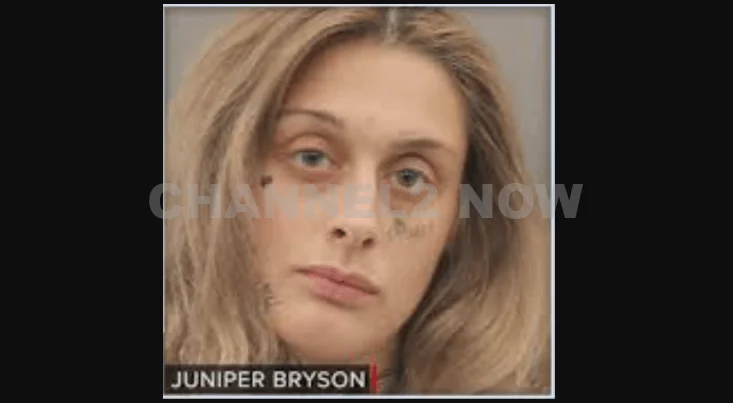
Houston Woman, 21-Year-Old Juniper Bryson, Arrested for Allegedly Attempting to Sell Newborn Baby via Facebook to ‘Highest Bidder’ in Disturbing Online Adoption Scheme
Houston Woman, 21-Year-Old Juniper Bryson, Arrested for Allegedly Attempting to Sell Newborn Baby via Facebook to ‘Highest Bidder’ in Disturbing Online Adoption Scheme; Accused Reveals Drug Use and Financial Motives, Leading to Formal Charges and Potential Criminal Penalties as Court Hearing Begins”
In-Depth Report on the Arrest of 21-Year-Old Juniper Bryson for Allegedly Attempting to Sell Her Newborn Baby on Facebook
Houston, TX – November 4, 2024
Houston resident Juniper Bryson, 21, faces significant criminal charges after allegedly attempting to sell her newborn baby on social media. The arrest has sparked both outrage and concern in the local community and beyond, with authorities denouncing the case as an alarming exploitation of online platforms. Charged with “sale or purchase of a child”—a felony under Texas law—Bryson’s actions have put a spotlight on potential gaps in the monitoring and regulation of private online adoption discussions. Held on a $30,000 bond, Bryson awaits her court appearance later today, where further details of her alleged attempt to profit from her child’s adoption may come to light.
How the Investigation Unfolded: A Timeline of Events
The case began in late September when Houston Police received a tip from a concerned citizen regarding Bryson’s activities on Facebook. Authorities reported that Bryson allegedly used Facebook as a platform to seek prospective adopters and “sell” her child to the highest bidder, despite existing legal channels for adoption. According to court documents, this initial tip spurred law enforcement into action, as investigators raced to piece together the extent and intent of Bryson’s activities.
September 21, 2024: Reaching Out to Acquaintances
The first significant development in the case occurred on September 21, when Bryson reportedly reached out to a family acquaintance, expressing her inability to care for her child and her intention to find adoptive parents. In this conversation, Bryson allegedly shared that her child would likely test positive for drugs at birth. By her own admission, she had struggled with substance use throughout her pregnancy, which further complicated her ability to provide a stable home for her newborn. This disclosure raised alarms for those following the case, as the impact of prenatal drug exposure on newborns is a major public health and social concern, often requiring extensive medical and developmental interventions.
September 23, 2024: Facebook Group Post Sparks Suspicion
Two days after reaching out to her acquaintance, Bryson reportedly joined a Facebook group designed to connect birth mothers with prospective adoptive families. This type of group, while often legitimate and supportive, operates within a loosely regulated space, and Bryson’s alleged intent quickly raised red flags among group members. Court records indicate that Bryson used her location as “Houston” in her post and stated her willingness to travel if necessary to complete the adoption process. Her actions suggested a calculated attempt to broaden her reach and increase her chances of finding a willing buyer, disregarding the necessary legal frameworks for adoption in Texas.
By this time, Bryson’s actions had drawn the attention of social media users who were concerned about her motives and the possible exploitation of her newborn. Alarmed by her posts, some users flagged her profile to Facebook’s moderators and directly contacted local law enforcement, leading to the opening of a formal investigation by Houston Police.
September 24, 2024: The Birth of the Newborn and the Adoption Arrangement
On September 24, Bryson gave birth at a Houston hospital, with an acquaintance—whom police described as a potential adoptive parent—present in the hospital room. Although this individual’s specific involvement in the arrangement remains under investigation, authorities are examining whether the acquaintance was part of the original online discussion or a new entrant to Bryson’s adoption arrangement. Witnesses reported that Bryson appeared intent on finalizing an informal adoption deal immediately following her child’s birth.
Houston Police received additional tips from concerned individuals who had reportedly seen private messages in which Bryson allegedly indicated her intent to secure “the highest bid” for her child. In these exchanges, Bryson purportedly discussed financial compensation for the adoption, adding another layer of suspicion and prompting police to move forward with more formal investigative steps.
Legal Implications and Charges Against Bryson
Bryson is currently held on a $30,000 bond, and she faces serious felony charges that carry significant legal ramifications. Texas law treats the sale or purchase of a child as a severe offense, given its association with potential human trafficking, child endangerment, and abuse. Under Texas Penal Code Section 25.08, anyone found guilty of this crime could face between two and ten years in prison, alongside potential fines of up to $10,000. Moreover, given the nature of this case, additional child welfare or drug-related charges could emerge, depending on the outcomes of ongoing investigations.
The legal team representing Bryson has not yet released a public statement, but court records show that her attorney is expected to argue that her actions were out of financial desperation and a lack of understanding of proper adoption procedures. Legal analysts following the case have noted that Bryson’s intent, while reprehensible, may be partially influenced by economic strain and substance dependency, factors that often complicate both criminal cases and social service interventions.
The Intersection of Social Media and Unregulated Adoption Practices
Bryson’s alleged activities have reignited conversations about the growing use of social media for private adoption arrangements and the inherent risks. Although many legitimate adoption agencies and child welfare organizations use social media to reach prospective adoptive parents and connect them with birth mothers, private and unregulated exchanges such as Bryson’s have also proliferated.
Advocates warn that, without stricter oversight, social media can become a dangerous platform for exploitation. Law enforcement agencies and legal experts are calling for updated regulations that would restrict unvetted adoption-related posts and promote safer, legally compliant pathways for those seeking or considering adoption. They are also urging social media companies like Facebook to implement more robust monitoring tools that can flag suspicious activity.
The broader community in Houston has voiced concerns over how easily individuals with questionable motives can exploit social media platforms to bypass legal safeguards. Child welfare advocates emphasize that legal adoptions are carefully regulated for the child’s protection and argue that online adoption groups should work closely with authorities to prevent cases like Bryson’s from slipping through the cracks.
Impact of Prenatal Drug Exposure on Newborns and the Role of Social Services
As Bryson herself indicated, her newborn child was likely to test positive for drugs, highlighting a critical issue that often accompanies cases of substance abuse during pregnancy. Prenatal drug exposure can lead to a range of serious health complications for infants, including neonatal abstinence syndrome (NAS), developmental delays, and long-term physical and cognitive impairments. These risks are well-documented in medical literature, underscoring the need for specialized care for children born under such circumstances.
This case also raises questions about the role of social services in intervening when expectant mothers with substance dependencies face unplanned or crisis pregnancies. Advocates argue that providing better access to addiction support and prenatal care programs could help prevent desperate measures like Bryson’s alleged attempt to sell her child. By connecting at-risk mothers with resources and support, child welfare organizations can mitigate the chances of similar situations arising in the future.
Community Reaction and the Path Forward for Child Protection
The news of Bryson’s arrest has sparked outrage among residents and advocacy groups in Houston. Community members have expressed sympathy for the newborn involved, with many calling for increased resources to assist vulnerable families and protect children from similar forms of exploitation. Local organizations have begun raising awareness around adoption alternatives, encouraging expectant mothers facing financial or personal hardships to reach out to licensed agencies and support networks.
In response to the incident, community leaders are working to strengthen ties with adoption agencies, family services, and mental health providers to create a more supportive environment for parents in crisis. Through this coordinated effort, Houston aims to reduce the stigma around seeking help and to educate parents about safe, legal adoption pathways.
Child protection organizations have issued statements reminding the public of available resources and hotlines for expectant parents facing difficulties. The city’s Department of Family and Protective Services has increased outreach efforts, distributing informational materials on legal adoption options and substance use treatment services for at-risk families.
Looking Ahead: Addressing Systemic Issues and Ensuring Accountability
As the legal proceedings unfold, Houston’s child welfare advocates remain focused on addressing the systemic issues that led to this case. The combination of substance use, financial desperation, and lack of support created a situation that allowed Bryson to allegedly consider selling her child—a tragedy that underscores the importance of preventative measures and community support.
The community’s response to Bryson’s case highlights both the outrage at such exploitation and the resolve to prevent future cases through outreach, education, and tighter regulation of online platforms. Local and state officials are collaborating to push for reforms that will enhance social media oversight and promote safer adoption practices.
Houston’s ongoing efforts, coupled with legal actions against Bryson, demonstrate a commitment to ensuring accountability and justice for the affected child. As the case progresses, it stands as a reminder of the community’s duty to protect vulnerable children and to support those who may be struggling in isolation. By addressing the roots of the issue, from substance dependency to financial insecurity, Houston hopes to foster an environment where every child’s future is safeguarded and every parent in crisis has access to compassionate and constructive assistance


